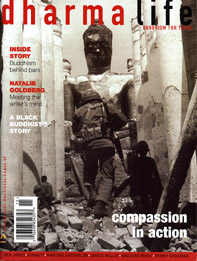Sweet Surrender
One year ago Buddhists were surprised to learn that Paul Williams, Professor of Indian and Tibetan Philosophy at Bristol University, had decided to convert to Catholicism after 20 years as a practising Buddhist. Writing in the Catholic newspaper The Tablet, he has now offered an explanation.
In his article, entitled ‘Out of my Head’, he writes that his conversion was prompted by Cardinal Ratzinger’s comments that Buddhism is ‘a form of spiritual auto-eroticism’ (see ‘No Self Abuse for Cardinal’, Dharma Life 5). Williams found himself agreeing that ‘Buddhism is all about the mind’, and contrasted that with Catholicism, which is ‘all about God ...Instead of reducing everything to subjectivity ... everything – but everything – reduces to God and to the Family of God ... God is not a mental state’. Williams also values the Catholic encounter with the presence of God through the sacraments, and the Christian community which comes together, he suggests, in its salvation through Christ.
Williams has little time for those who wish to combine Buddhism and Christianity. ‘No matter how we detect similarities in detail (taken out of context) we have here quite different perspectives on reality, and on our highest destiny.’
Buddhists may well agree that the differences are real, but not necessarily for the reasons Williams gives. He suggests that Buddhism is concerned with subjectivity, without mentioning that the aim of Buddhist practice is to go beyond self-preoccupation. For Buddhists this is the path to a non-dual reality, which leads to unselfish compassion. He values the Christian community, but makes no mention of Sangha, the Buddhist spiritual community, which is one of its core values and institutions. There is also no mention of Buddhist traditions of ‘other power’, which teach that progress can be made by opening to the power of the Buddhas, and may be Buddhism’s historical answer to Williams’ objections.
Western interest in Buddhism may well have evolved from western preoccupation with subjectivity and consciousness, but this tells us nothing about Buddhism itself. Buddhists should welcome critics, especially well-informed ones, but they will hope that Williams’ criticisms become sharper and more accurate. It is hard to understand how so knowledgeable a commentator could depict Buddhism in a way that seems so much like the old image of Buddhists contemplating their navels. Perhaps the elements of Buddhism that are ignored by Williams were never strong aspects of his own Buddhist practice.
He concludes: ‘Buddhism had exhorted me to seek liberation in letting go. But what happens when you let go of letting go?’ Williams communicates a sense of exhaustion with Buddhism and relief in finding ‘the Everlasting Arms’ of Christian salvation. But while ‘what happens after letting go of letting go’ may be opening out, it may also be giving up.



